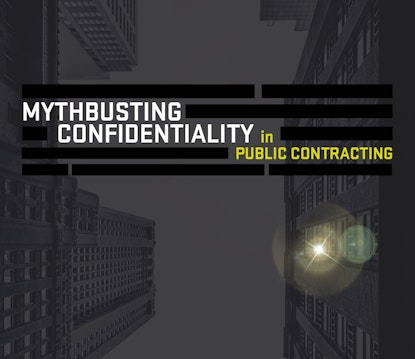#Busted: The many myths of why government contracts should not be published

Government officials and contractors often tell you that less is more when it comes to knowing how your money is being spent. Like eating your greens and going for a run, this opacity in the trillion-dollar global marketplace of public contracting is good for you apparently. They’ll say it protects competitiveness, respects commercial confidentiality and prevents collusion.
Do these arguments stand up?
When we quizzed experts and reviewed research on public contracting, we found surprisingly little evidence that backed up the harm supposed caused by publishing contracts. And we found quite a lot of evidence that does not support them. Among 70 global specialists from government, business and civil society in 20 countries, the consensus seemed to be that intelligently, intentionally making public contracting information ‘open by design’ led to significantly improved outcomes in those countries where it has been tried. As we explain in our new report, these countries saw more competition, better deals and savings.
Among the common rationales for not publishing most government contracts, there were particular myths that stood out: the ‘3Cs’ that it harms competition, supports collusion, and undermines commercial confidentiality.
But the facts told us a different story.
We found that opening up contracting information increased competition. Information on contracts is of huge interest to businesses wanting to get contracts with the government, helping them research the marketplace and know when contracts come up for review
Companies currently file thousands of Freedom of Information requests in countries like the US and the UK. Why not give them the information openly and proactively?
In Slovakia, the average number of bidders doubled after procurement reforms required the default publication of contracts and the use of e-procurement systems.
In Ukraine, thousands of new suppliers are doing business with the government after greater transparency and an open source e-procurement system based on our Open Contracting Data Standard were introduced. The average number of unique suppliers grew by 45%, searches for information on contracts grew a thousand-fold and the government saved over a billion dollars on its budget.
An academic study of 3.5 million procurement records across Europe found a clear correlation between publishing more information about tenders and a reduced likelihood of single-bid contracts, equivalent to savings of about €3.6-6.3 billion per year.
In Colombia, half of the contractors who won government bids under its new, more open procurement system in 2015 had never participated in public contracting before.
Collusion takes place in every country, whether or not that country discloses contracting information. Disclosing more information doesn’t appear to make it easier to form cartels or improve their duration. Most companies are already well aware of who their competitors are, and it turns out that more information means cartels dissolve sooner as cheating is more evident.
In fact, an increasing number of governments routinely analyze contracting information to detect collusion. In Bogota’s school meal program, open and transparent processes helped directly detect and break up an alleged price-fixing scheme that could have raised the cost of meals by over $7 million.
Onto commercial confidentiality. Not all contracting information will be published all the time but we have to avoid a lazy default where routine information is classified as confidential to prevent scrutiny.
There may be exceptions for national security and commercial secrets but the amount of contracts that are genuinely confidential is small: only 2.7% of defense contracts in Australia were flagged as confidential and this is from the most secretive part of government.
Keep contracts simple too: there’s often no need to put proprietary information (like Coca Cola’s secret formula) in a government contract, for example. Most procurement information is only sensitive for a definable period of time, after which it should be disclosed. In most jurisdictions, financial and technical proposals, and proposed prices aren’t disclosed until a contract is awarded.
Government agencies should show why information is commercially sensitive and needs to be redacted. The UK has started using a ‘refusal notice’ explaining redactions to its public contracts. The burden of proof of harm should be on the person seeking the redaction.
Publishing government contracts is now standard in many countries. Even in the oil and mining sector – once a bastion of secrecy – over 20 countries now require the publication of contracts. Investment in them has been unaffected (and has probably increased as it is a sign of improving public integrity). Some major international companies – such as Total or Rio Tinto – are actually encouraging the publication of contracts themselves as it improves public trust and prevents renegotiation.
There is a better way for the government to do business. Open contracting can save money and time for everyone, increase public trust and probity and improve competition and sustainability of contracts.
So definitely eat your greens, maybe go for a run, but don’t believe the myths around confidentiality of public contracts.